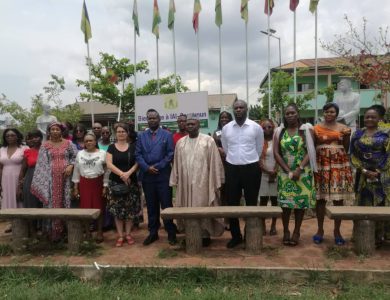As Cameroon and the world observe the 2024 World Breastfeeding Week on the theme, “Closing the Gap: Breastfeeding Support for All”, lactation consultants explain that everyone can support breastfeeding mothers.
One of such is Dr Solange Ngo Bama, a Certified International Breastfeeding and Lactation Consultant with eight years of experience of supporting mothers and families on their breastfeeding journey.
Be a Breastfeeding Advocate
The Lactation Consultant says that one of the ways of bridging the gap in order to support breastfeeding mothers is by first, advocating for inclusive support.
“Ensure that wherever you are, be it in the office with a colleague that is breastfeeding, be it as a manager of a bank, be it as a CEO, a teacher, wherever you find yourself, advocate for policies that support mothers adequately to effectively breastfeed. It can be through resources, or just emotional support. You have the power, especially if you are a decision-maker, to help these mothers,” she points out.
Emotional Support
About emotional support, the medic highlights the “Ubuntu” spirit in Cameroonians. “We are always very glad to welcome a new baby into the family. However, we sometimes get very insensitive towards the mother, especially a new mom, on how she lives this postpartum experience. Let us offer her emotional support. It is very vital in boosting the mother’s confidence and helping her overcome her own emotional challenges,” the Lactation Consultant argues.
“The mother should be able to feel free to express her challenges to the people around her and understand that she is supported,” Dr Solange adds.
Stop Reinforcing Myths surrounding Breastfeeding!
One other problem which the Doctor says people must stop so as to support mothers postpartum is the reinforcement of myths surrounding breastfeeding.
“The milk is spoiled, or you cannot breastfeed, or you cannot be away from your baby and breastfeed, or you can also give water… All these mixed signals, cause the mothers to be in emotional trauma. This is not helpful, especially because breastmilk supply is related to not only hormones, but also the mother’s emotional state. So we should be watchful with that aspect,” the Doctor warns.
Education is key towards Supporting the Mother
“The next thing is educate yourself and inform others. I just spoke about not giving babies water in the first six months of life. It may sound banal until a baby starts having hiccups or a grandmother or an aunty says that a baby is not full and requests you give the baby water. No, we need to dispel this myth as much as we can within our community so that we get more supportive with the challenges that the mother has rather than re-emphasizing on the myth,” Dr Solange pleads.
Creating Breastfeeding Spaces / Lactation Rooms
The medic also calls on bosses to create very comfortable spaces for breastfeeding mothers.
“I am a doctor, and I would want to see higher institutes of learning, especially residency programs for resident doctors that have lactating spaces, a place where a mother can go comfortably and pump breast milk for her baby, though the baby may be separated from her. Are you in the education sphere? In the army? Are you in the security forces? Are you a banker? Wherever you find yourself, please, please, and please, in order for us to be able to support these women who work, we need to find comfortable places for them to breastfeed. We already do that in churches where maybe we give them space on the last pew, but is there a better way? Is there a way that you can advocate for clean, comfortable spaces within your church community as a religious leader, or as an executive, or as a professor in the university, where breastfeeding mothers can go to breastfeed or pump milk? It’s going to help our mothers a long way,” the medic insists.
Assist in Chores
The Doctor also encourages those in households with breastfeeding mothers to support them with household chores like cleaning, cooking and caring for the other children to reduce stress.
The Lactation expert explains, “This will free up time for her and help her with the energy she needs for breastfeeding.”
Create Lactation Groups
Dr Solange also encourages the creation of support groups.
“You can find maybe first-time mothers, mothers who gave birth to babies a little later in life or earlier in life, and create support groups to help them. The challenges are not the same so they could share experiences and get expert counsel. Unfortunately, we are 37,000 breastfeeding and international breastfeeding / lactation consultants over the world but for now, I’m the only one in Cameroon and the Central African sub-region. One lactation consultant is not enough!” Dr Solange Ngobama laments.
“It is important that we advocate to get more specialized training. It is not because you went to medical school that you can support a woman who breastfeeds; it is not because you are a gynecologist or a pediatrician. In fact, all of us have the skills, but there is a special skillset meant for those people. I therefore encourage healthcare workers, midwives, and those who are in contact with these breastfeeding mothers to update their knowledge so that they can effectively help these mothers on their journey. It is a blessing that, we can talk about closing the gap by offering support for all mothers,” concludes the Lactation Consultant, Dr Solange Ngo Bama.
So what are you waiting for? Yes you! Join her and others to close the gap and provide breastfeeding support to all!
Eleanor Ayuketah Ngochi










